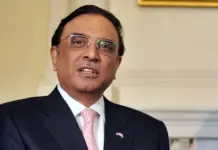Interior Minister Sheikh Rashid on Wednesday said that government is trying its best to empower women which is a vital factor for wellbeing and growth of a nation.
He said that government is serious about providing equal rights, responsibilities and opportunities to all genders. The incumbent government has taken several significant measures that promote social inclusion, gender equality and women empowerment, he added.
Sheikh Rashid expressed these views while speaking to the 12th Annual General Meeting (AGM) of Islamabad Women’s Chamber of Commerce and Industry (IWCCI) in which Naima Ansari was elected as President unopposed for the year 2021-22.
Sadaf Asim Abbasi was elected as Senior Vice President, while Rubina Shafqat became Vice President.
The Interior Minister said that every person should have equal access to health, education, water and sanitation, and growth which is imperative for ending hunger and poverty.
Representation of women in public as well as private sector organizations improves performance due to better decision-making, he said, adding that pay gaps, limited mobility, discrimination, and lack of job security are some of the barriers towards women empowerment.
Sheikh Rasheed said that these challenges have now been aggravated by the pandemic which has resulted in new obstacles to building inclusive and prosperous societies.
Speaking at the occasion, Founder President IWCCI Samina Fazil said that gender gaps already existed in our society which have been augmented by the pandemic.
The pandemic has damaged majority of the businesswomen and we would like to remind the minister regarding his promise to establish markets for women.
Samina Fazil said that majority of women in Pakistan work in the non-formal sector, where they work for long hours with low wages, no benefits and no job security.
Newly-elected President IWCCI Naima Ansari said that according to the Global Gender Gap Report 2021, Pakistan ranked 153rd out of 156 countries as per gender parity index.
There is a great deal of evidence that societies that discriminate on the basis of gender pay a price in more poverty, slower growth, and a lower quality of life, whereas gender equality enhances development, she added.












